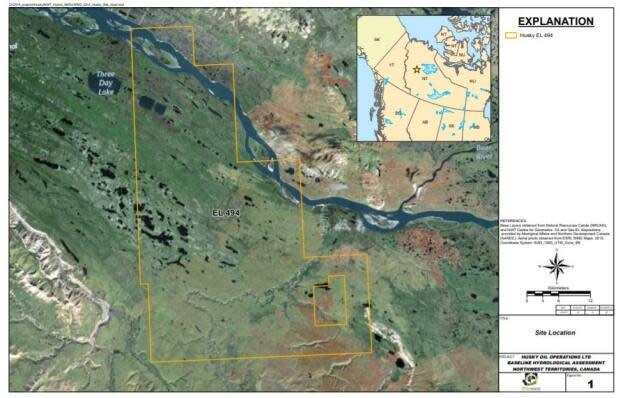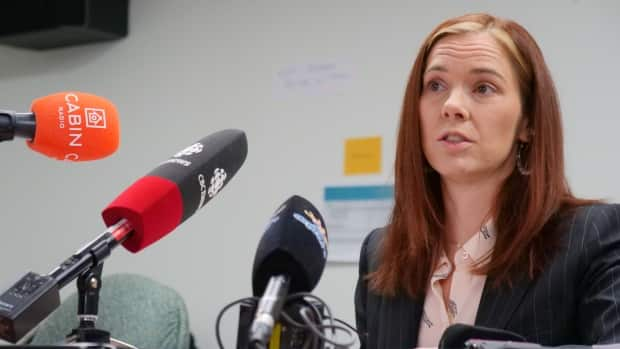N.W.T. MLA, Industry minister at odds over imposing $21M fee on oil company

An N.W.T. MLA says the territory will lose out on $21 million in potential payments for an oil interest in the Sahtu by converting an exploration licence into a significant discovery licence without imposing fees or conditions.
Industry Minister Caroline Wawzonek says springing the new regulatory regime on Husky Energy, recently absorbed by Canada's third-largest oil and natural gas producer Cenovus Energy, will expose her government to "legal risk."
The company's exploration licence on lands between Tulita and Norman Wells, N.W.T., required $1.4 million in annual payments. Under the previous legislation, those fees were not required to carry over into a significant discovery licence.
It's the first such conversion of an exploration licence since the territory amended Petroleum Resources Act, said MLA Kevin O'Reilly.
Under that new legislation, O'Reilly says the minister could, but will not, use her powers to impose terms and conditions, such as carrying over the $1.4 million annual fee.
"Why did we go to the extent of changing this legislation in the last assembly to see a new minister not stand up for the North and claim benefits and just give away these rights to a company for 15 years?" he said.
Legal opinion influences decision

Wawzonek says the territory's legal experts have weighed in, and that company met the conditions to merit a significant discovery licence on the Dehcho (Mackenzie River), between Tulita and Norman Wells.
Wawzonek says companies deserve regulatory predictability and that Husky's lease is the last conversion from exploration to significant discovery to be grandfathered from the previous regime.
Now that Cenovus it has its significant discovery licence, it will be "working closely with the communities and vendors for ongoing site inspections, reclamation, care and maintenance of our existing project components," a company spokesperson wrote in an email.
'Huge post-devolution resource giveaway'

The last Legislative Assembly put through the Petroleum Resources Act to update legislation it inherited from the federal government during devolution, and made improvements like imposing a 15-year limit on developing significant discoveries.
This term limit is a "hard deadline" for the N.W.T.'s industry minister to decide if it is in the territory's interest to continually grant exclusive interests to develop that land, the government's website states.
Before the legislation came into effect, former Industry Minister Wally Schumann issued ten significant discovery licences covering 2,200 square kilometres.
That's roughly 16 times the size of Yellowknife — or about three Edmontons.
"This was a huge post-devolution resource giveaway," said O'Reilly in the assembly March 9.
"Our government will get no revenues, no taxes, no employment, and no benefits from these areas that are now tied up virtually forever," he said.
In many cases, companies did not have to perform work to get the licenses, he said.
"Companies that had rights adjacent to [a significant discovery], were able to ask for and receive a significant discovery licence…. It's just a totally crazy system. It doesn't encourage any benefits whatsoever for Northerners," he said.
In total, there are now more than 90 significant discovery licenses covering more than 4,760 square kilometres of the N.W.T., said O'Reilly.
"These companies don't have to do anything forever and that's just wrong," he said. "That's why we tried to fix it in the last assembly. But [Minister Wawzonek] seems to think that it ties her hands and it doesn't allow her to require benefits."
Time for consultation has passed
O'Reilly says Wawzonek should have consulted with Sahtu communities and regular MLAs on the licence conversion.
However, consultation takes place when there are calls for bids for an expiration licence. In Husky's case, that process was completed in 2010 through to 2012, prior to devolution by the federal government, which makes launching a consultation process now outside the minister's authority, she said.
O'Reilly said even though consultation may not be required, it should be done.
"That's the kind of engagement and partnerships we should be striving for with Indigenous governments, not just going ahead and deciding what we're going to do on our own," he said.
"That's just not why we got devolution in the first place. We were going to do things better than the feds, and that's just not happening," he said.
Legal risks now, regulatory certainty for the future
Wawzonek said companies newly entering the N.W.T.'s regime can expect terms and conditions, including annual fees, under significant discovery licences, but imposing them on Husky now would be tricky.
The new Petroleum Resources Act "changes the structure of petroleum resources, exploration and development quite significantly for the Northwest Territories," said Wawzonek.
Long term, that translates into more proactive measures and imposed rental fees and work requirements, she said.
There was debate about whether the company falls under the new provisions, because when they entered the regulatory system, "there were no such provisions," said Wawzonek.
Conditions 'not legally appropriate'
The company could reasonably expect to move into an significant discovery licence without any long-term requirements, she said.
Technical experts in the legal department say imposing fresh conditions carries a "legal risk" for the territorial government, said Wawzonek — and, further, the company would have to agree to the conditions.
"We've said 'Look, you've met your conditions, that takes away my discretion, you get the licence and applying any conditions to it at this point would not be legally appropriate,'" she said.

